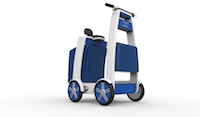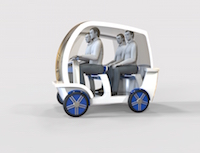You are heree-mobility
e-mobility
The disruptive nature of automated Mobility as a Service
Altreonic has published a new article on the Move Forward website. Below the abstract:
Autonomous vehicles will change the way people lead their lives and move around in cities. There is a likely possibility that self-driving technology will cause a shift from a private to a shared mobility service. The disruptive nature of automated Mobility as a Service (MaaS) is comparable to what internet did for information and communication (bringing it down to a low marginal cost). This time however, the impact will be deeper as it impacts us much more physically. At the same time, it solves a real problem as people are increasingly gridlocked in traffic. But, how will this likely disruptive transition impact other modes of transport, our society and the economy?
Altreonic moves to larger offices
Since 10th August 2015, Altreonic's operational offices are located at: Staatsbaan 4A/1, 3210 Lubbeek, Belgium (close to Leuven, 30 minutes from Brussels. See the contact page for details and an access map. The new offices are an important step towards further development of the e-mobility KURT product group.
Smart e-vehicles for a smarter mobility
A few possible scenario’s to recover our mobility in the city.
 Mobility and communication are two essential mechanisms for social interaction. They also determine how efficient economies can operate. This is why people often tend to live and work in cities or locate their activities in close proximity as it shortens the interaction distance. Communication has seen a revolutionary evolution in the last decades. We are now virtually reachable anywhere, any time of the day and sharing information is a click away. There is so much data being generated and available that we need smart applications to filter the essence from the noise.
Mobility and communication are two essential mechanisms for social interaction. They also determine how efficient economies can operate. This is why people often tend to live and work in cities or locate their activities in close proximity as it shortens the interaction distance. Communication has seen a revolutionary evolution in the last decades. We are now virtually reachable anywhere, any time of the day and sharing information is a click away. There is so much data being generated and available that we need smart applications to filter the essence from the noise.
 While internet and high bandwidth have brought down the cost of communicating to a very low marginal cost, the same cannot be said about our cost of moving. Of course, this is not a universal statement. Long distance travel, using airplanes and ships is more efficient and safe than ever. Even cars have become relatively cheap if one takes into account the comfort they now provide. What is hampering the economy is the mobility at city level. Unless we move out of the cities again, what is unlikely to happen as cities are spreading from the suburbs, we need to find solutions to give us again the mobility we need. Even with all avatars in the world humans need face-to-face interaction.
While internet and high bandwidth have brought down the cost of communicating to a very low marginal cost, the same cannot be said about our cost of moving. Of course, this is not a universal statement. Long distance travel, using airplanes and ships is more efficient and safe than ever. Even cars have become relatively cheap if one takes into account the comfort they now provide. What is hampering the economy is the mobility at city level. Unless we move out of the cities again, what is unlikely to happen as cities are spreading from the suburbs, we need to find solutions to give us again the mobility we need. Even with all avatars in the world humans need face-to-face interaction.
Roadmap for an e-mobility platform
When a crisis becomes an opportunity
The economic crisis we witness today has everything to be considered as a catastrophe, signalling the end of an economic dream. It might however be a lot better to see the crisis as a wake-up call. With hindsight, it is clear the crisis has been growing for about a decade and what we experience now is a painful correction. Rather than stretching the dream, we would do better by standing up and by looking forward. Beating the crisis means we create again real economic value, rather than (over-)consumption.